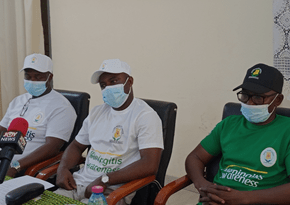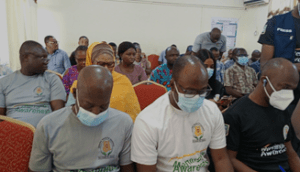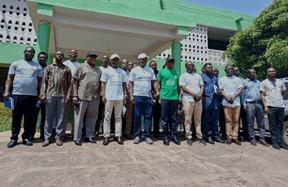By Rafiq Nungor ADAM
The Health Minister, Kwabena Mintah Akandoh, has vowed to tackle the meningitis situation in Upper West Region where 14 lives have been lost, with 94 suspected cases and 20 confirmed cases reported so far. He assured that government will do everything possible to contain the outbreak.
Upper West Region is not unfamiliar with meningitis, as it lies within the meningitis belt and experiences a long dry spell between October and March.
On his first assignment out of Accra, the health minister visited Wa where he met with staff of the regional health directorate to interact and familiarise himself with the situation.
Interacting with media, Minister of Health Kwabena Mintah Akandoh assured Ghanaians that government will do everything possible to contain the disease.
“Going forward, we are going to provide whatever it takes to contain this disease. Now, we have brought some number of items – including antibiotics – and we have supplied enough. The directive is that anybody who suspects they have symptoms, whether sneezing, coughing or experiencing neck-stiffness, must rush quickly to the nearest health facility where they will be taken care of free of charge.”

He also called on media to help educate the public on the importance of reporting Meningitis cases early, as the disease does not discriminate by colour or religion. “I also call on all of you, especially the media, to be part of fight against Meningitis. Education and sensitisation are key, let’s all be involved
“Diseases do not know colour or religion, so let’s all be participate in sensitising the public. The good news is that for the past one week we did not record any deaths, so it is well-contained. There is no cause for panic. Health professionals, both local and national, are on top of their work.”
Akandoh cautioned that 94 suspected cases have been recorded, 20 confirmed cases and 14 deaths. “We have to be very careful here in putting out the figures.”

The regional director of health, Dr. Damien Punguyiei, provided a situational report on the meningitis outbreak.
“The dry season in the north is usually very dry and windy. Due to these climatic conditions, we have challenges with perennial outbreaks. Additionally cross-border exchanges and poor housing conditions where people live in crowded and poorly ventilated environments, including schools, contribute to the region’s risk profile.”
The health minister, along with the acting Director General and entire team, visited the Overlord of Waala traditional council before heading to Nadowli Kaleo district, which recorded the highest number of deaths at five.











